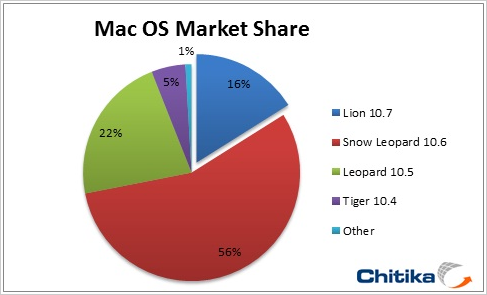Report: Mac OS X 'Lion' uptake has almost flatlined

Web ads publisher Chitika has released data which suggest that adoption rate for Apple's Mac OS X 10.7 'Lion' has flatlined.
According to Chitika, Lion initially enjoyed a stellar adoption rate, but despite this it is still only the third most popular version of Mac OS, trailing behind Snow Leopard and Leopard.
Since September, growth in Lion adoption has almost flatlined:
Lion's adoption rate has been less than stellar, to say the least. While we are seeing consistent monthly growth, Lion isn't taking off the way some had anticipated. From June to September, Lion's share grew at about 4.05% each month. Since September, Lion's monthly growth has slowed to a rate of 0.98%.
If this data is anything to go by, consumers aren't drawn to Lion and its $29.99 upgrade price tag.
What's behind this stunted growth? Chitika suggest that it might be a mix of problems and the fact that the OS is too similar to iOS:
One of the most frequent complaints about Lion is that the user interface behaves too much like iOS, the operating system on iPhones, iPods, and iPads. While iOS has proven successful on Apple’s product mix, this look isn’t a winning formula on computers. Other notable issues include Wi-Fi stability, poor battery life on MacBook Pros, and an inverted “natural scrolling” function.
So what's going on here? Is the data representative of the entire Mac ecosystem? Is the OS too cheap, or too expensive? Is it too much of a hassle to download a 4GB OS? Is there just not enough new stuff to draw people in? Or have teething troubles kept people away from the OS? Or, just like it is with Windows, do most people wait to buy a new computer to get the latest OS?
I'm inclined to believe that there are a lot of people who either don't know about Lion, or who are simply waiting until they buy a new Mac to get their hands on the OS. A new operating system isn't the all-important commodity that it once was.
What do you think?
